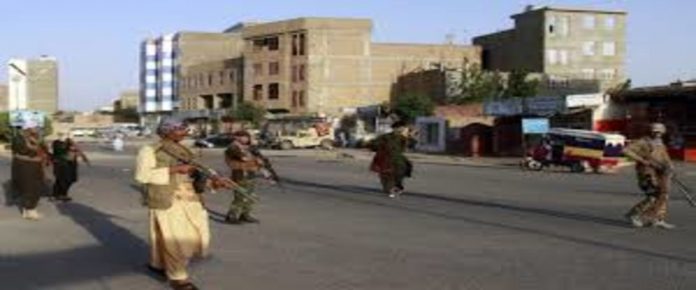Members of the United Nations Security Council made it clear on Friday that the international community will not tolerate any Taliban-imposed government in Afghanistan, even as India called for the destruction of terror safe havens and sanctuaries in Pakistan.
Deborah Lyons, the UN secretary-special general’s representative, told a Security Council meeting conducted under the Indian presidency to review the situation in Afghanistan that the country was at a “dangerous turning point” as a result of the Taliban’s huge campaign of violence and attacks.
The majority of the Security Council’s 15 permanent and non-permanent members opposed any military takeover by the Taliban, and representatives from France and the United States said that failure to end violence would jeopardise further exemptions from sanctions on Taliban leaders, particularly for travel.
India has the Security Council’s rotating presidency for August, and it played a crucial role in organising the discussion on Afghanistan.
TS Tirumurti, India’s UN envoy, cited a rise in Taliban attacks and violence, including a suicide attack on the Afghan defence minister’s home and the assassination of Indian journalist Danish Siddiqui, and said the security situation is rapidly deteriorating, posing a “serious threat to regional peace and stability.”
In an obvious reference to Pakistan, Tirumurti said: “For enduring peace in Afghanistan, terrorist safe havens and sanctuaries in the region must be dismantled immediately and terrorist supply chains disrupted. It needs to be ensured that Afghanistan’s neighbours and the region are not threatened by terrorism, separatism and extremism.”
He urged for “zero tolerance” for all types of terrorism, as well as ensuring that terror groups do not use Afghan soil to threaten or attack other countries. “Those providing material and financial support to terrorist entities must be held accountable,” he continued.
The world community should “decide on actions that would help bring a permanent and comprehensive ceasefire”, and ensure the Taliban “engage in negotiations in good faith, eschew the path of violence, severe ties with al-Qaeda and other terrorist organisations, and fully commit itself towards reaching a political solution”, Tirumurti added.
He also reaffirmed New Delhi’s support for an inclusive Afghan-led, Afghan-owned, and Afghan-controlled peace process that leads to a political settlement that safeguards the gains of the previous two decades and women’s, children’s, and minority rights.
Ghulam M Isaczai, Afghanistan’s UN representative, was even harsher in his criticism of Pakistan’s role in supporting the Taliban, which he claimed were being aided in acts of brutality by “foreign fighters from trans-national terrorist networks.”
Since mid-April, more than 10,000 foreign fighters representing 20 groups, including al-Qaeda, Lashkar-e-Taiba (LeT), Tehreek-e-Taliban Pakistan (TTP), Islamic Movement of Uzbekistan (IMU), East Turkestan Islamic Movement (ETIM), and Islamic State, have launched more than 5,500 attacks.
“Importantly, the Taliban continue to enjoy a safe haven in and supply and logistics line extended to their war machine from Pakistan. Graphic reports and video of Taliban fighters congregating close to the Durand Line to enter Afghanistan, fund-raising events, transfer of dead bodies for mass burial and treatment of injured Taliban in Pakistani hospitals are emerging and are widely available,” Isaczai said.
“Consistent with the agreement of the leadership of Afghanistan and Pakistan in Tashkent last month, we urge Pakistan to help with removing and dismantling of Taliban sanctuaries and supply lines and establish with us a joint monitoring and verification mechanism to make the fight against terrorism and international efforts for peace effective and credible,” he added.
The UK envoy to the UN, Barbara Woodward, said the Taliban must understand there will be consequences if they continue their military attack. “This conflict cannot be resolved through military means. “There can be no military solution to this conflict. For our part, the UK will not recognise a Taliban government that comes to power by force,” she warned.
The US representative condemned the increase in violent attacks and said: “The Taliban must hear from the international community that we will not accept a military takeover of Afghanistan or a return of the Taliban’s Islamic emirate. The Taliban will be isolated and an international pariah if they choose that path, which would most certainly push the country to further violence and destruction.”
Five principles for a negotiated and inclusive solution were listed by the US representative, including inclusive governance, the right of the Afghan people to elect political leaders, protection of human rights, a commitment to counter-terrorism and no safe havens for foreign terrorists, and adherence to international and humanitarian laws.
Special Representative Deborah Lyons requested that the Security Council release a clear statement calling for an end to attacks on cities, and those countries in contact with the Taliban’s political council demand a ceasefire and a return of talks. The Taliban commanders are exempt from the UN travel ban for the sole purpose of peace talks, and any further extension at a review on September 20 “must be predicated on real progress in peace,” she said.
The meeting was delayed for talks behind closed doors after the 15 members of the Security Council made their statements.




